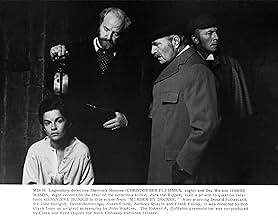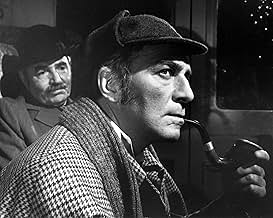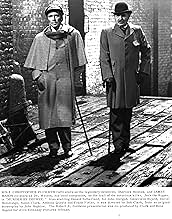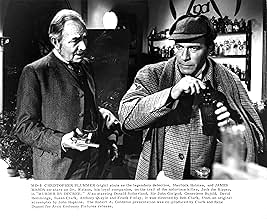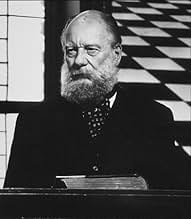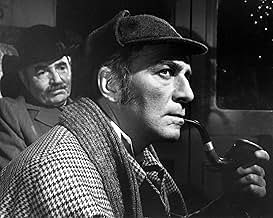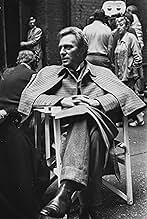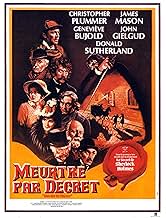IMDb रेटिंग
6.8/10
7.3 हज़ार
आपकी रेटिंग
अपनी भाषा में प्लॉट जोड़ेंSherlock Holmes investigates the murders commited by Jack the Ripper and discovers a conspiracy to protect the killer.Sherlock Holmes investigates the murders commited by Jack the Ripper and discovers a conspiracy to protect the killer.Sherlock Holmes investigates the murders commited by Jack the Ripper and discovers a conspiracy to protect the killer.
- पुरस्कार
- 5 जीत और कुल 5 नामांकन
Geneviève Bujold
- Annie Crook
- (as Genevieve Bujold)
Tedde Moore
- Mrs. Lees
- (as Teddi Moore)
फ़ीचर्ड समीक्षाएं
If you love the legendary London sleuth, dark, mysterious Victorian streets, an ample collection of plot twists, and good, solid acting, then this film is for you. It has a fine story about the meeting of the greatest detective Sherlock Holmes, Dr. Watson, and the mysterious Jack the Ripper in some of the best Victorian street settings filmed. Christopher Plummer is excellent as Holmes, giving him characteristics rarely seen in film such as humour and compassion. His Holmes is easily the most humane ever on screen, even at one point wiping tears from his face. James Mason makes a wonderful and amusing Dr. Watson. The rest of the cast is just as good and the story, although not very plausible, is nonetheless very intriguing and suspenseful.
In 1888 London, Sherlock Holmes (Christopher Plummer) and Dr. Watson (James Mason) are asked by a citizen's group to find and stop Jack the Ripper. For some reason the police don't want Holmes to investigate. However he does and as the bodies pile up Holmes and Watson slowly uncover a trail that might lead to the highest reach of British government.
This was released and died VERY quickly in 1979. I'm probably one of the few people who saw it in a theatre. The critics almost unanimously praised it, it had a huge cast of good actors...but it just died. That's too bad because this is a very good Sherlock Holmes film.
It's atmospheric (LOTS of foggy streets), has exquisite production design and is beautifully directed by Bob Clark (I love the way the first murder is done--very effective). Also the acting is great. Plummer gives a very good, different interpretation of Holmes--he makes him more emotional than other actors have...but it works. Mason nicely underplays the role of Watson--he does not make him a bumbling fool like Nigel Bruce did back in the 1940s. In small roles Susan Clark, John Gielgud and especially Genevieve Bujold are excellent. Donald Sutherland, Anthony Quayle and David Hemmings unfortunately are not that good.
There are some problems with this movie though. It's too long (a long sequence involving Watson and some prostitutes could have been completely cut) and is needlessly convoluted. Also they throw politics in the plot which seems out of place. And, strangely, Holmes' deductive reasoning is almost never used. He comes across more as a protector of the people than a detective. Plummer's performance though carries it through. It's quite bloody too--not enough for an R rating but pretty strong for the PG it got back then (PG-13 wasn't a rating yet).
Reservations aside though, I think this is one of the best Holmes' film ever made. Recommended.
This was released and died VERY quickly in 1979. I'm probably one of the few people who saw it in a theatre. The critics almost unanimously praised it, it had a huge cast of good actors...but it just died. That's too bad because this is a very good Sherlock Holmes film.
It's atmospheric (LOTS of foggy streets), has exquisite production design and is beautifully directed by Bob Clark (I love the way the first murder is done--very effective). Also the acting is great. Plummer gives a very good, different interpretation of Holmes--he makes him more emotional than other actors have...but it works. Mason nicely underplays the role of Watson--he does not make him a bumbling fool like Nigel Bruce did back in the 1940s. In small roles Susan Clark, John Gielgud and especially Genevieve Bujold are excellent. Donald Sutherland, Anthony Quayle and David Hemmings unfortunately are not that good.
There are some problems with this movie though. It's too long (a long sequence involving Watson and some prostitutes could have been completely cut) and is needlessly convoluted. Also they throw politics in the plot which seems out of place. And, strangely, Holmes' deductive reasoning is almost never used. He comes across more as a protector of the people than a detective. Plummer's performance though carries it through. It's quite bloody too--not enough for an R rating but pretty strong for the PG it got back then (PG-13 wasn't a rating yet).
Reservations aside though, I think this is one of the best Holmes' film ever made. Recommended.
Before the advent of Jeremy Brett "Murder By Decree" had the finest Holmes/Watson/Lestrade teaming in Christopher Plummer, James Mason and Frank Finlay. It's too bad they have such a ridiculous story.
The good: the acting is impeccable. All except a strangely dull, murmuring Donald Sutherland; and a blustery Anthony Quayle. For a more lively Victorian Sutherland catch "The Great Train Robbery."
The bad: everything else. In most Holmes movies he's bounding around London in his famous deerstalker cap and his cape. It's no different here. Holmes even wears this preposterous costume to the opera.
In 1888 Holmes and Watson were impecunious young men sharing digs until their careers took off (Watson wasn't yet married). Here, in 1888, they are prematurely aged, like two old codgers unable to get by alone on their pensions.
The story this is based on (I read Stephen Knight's book when I was young and impressionable) has long been exploded. Of course, in a work of fiction (and Holmes stories are all fiction) they can do what they like but I'd rather have seen this Holmes/Watson combination in a more rousing tale.
It's really silly from the first. Spooky as the empty East End streets are and fine as they are in setting a mood, the streets in the East End of London were teeming with people day and night. One of the biggest mysteries of Jack the Ripper (if one hand was "Jack the Ripper"--we know the blanket name grouping a series of similar murders was an invention of the sensational "fake news" press) is how the victims were all taken to secluded areas. Obviously, the murderer(s) had to be denizens of that area, knowing where to go for seclusion and how to escape swiftly.
Other silly points of this story are the closed carriage. The thing about so-called Jack the Ripper is the facility with which he or she or they came and went with no one noticing anything. A fancy carriage would be noticed. But so would a man in a high hat and cape carrying a patent leather Gladstone doctors' bag: the stereotypical Ripper image.
Worth watching is Mason's competent, courageous, yet still humorous Watson (though I can't imagine a doctor who bravely operated on the field of battle being squeamish about the injuries suffered by "Ripper" victims).
It's a shame because Plummer and Mason are so perfect for their parts and so good. I'd like to have seen them do other Sherlock stories! Also, I've been a Mason myself for thirty years and though I grew disenchanted with them, the Masonic stuff is half-rubbish. But as an honorable fellow who won't violate his Masonic code, disenchanted or not, I can't say which half.
Not only do we have a first rate Holmes/Watson combination, we have a subtle, extra-canonical David Hemings. But I love Plummer, Mason (odd name for this yarn) and Finlay.
The good: the acting is impeccable. All except a strangely dull, murmuring Donald Sutherland; and a blustery Anthony Quayle. For a more lively Victorian Sutherland catch "The Great Train Robbery."
The bad: everything else. In most Holmes movies he's bounding around London in his famous deerstalker cap and his cape. It's no different here. Holmes even wears this preposterous costume to the opera.
In 1888 Holmes and Watson were impecunious young men sharing digs until their careers took off (Watson wasn't yet married). Here, in 1888, they are prematurely aged, like two old codgers unable to get by alone on their pensions.
The story this is based on (I read Stephen Knight's book when I was young and impressionable) has long been exploded. Of course, in a work of fiction (and Holmes stories are all fiction) they can do what they like but I'd rather have seen this Holmes/Watson combination in a more rousing tale.
It's really silly from the first. Spooky as the empty East End streets are and fine as they are in setting a mood, the streets in the East End of London were teeming with people day and night. One of the biggest mysteries of Jack the Ripper (if one hand was "Jack the Ripper"--we know the blanket name grouping a series of similar murders was an invention of the sensational "fake news" press) is how the victims were all taken to secluded areas. Obviously, the murderer(s) had to be denizens of that area, knowing where to go for seclusion and how to escape swiftly.
Other silly points of this story are the closed carriage. The thing about so-called Jack the Ripper is the facility with which he or she or they came and went with no one noticing anything. A fancy carriage would be noticed. But so would a man in a high hat and cape carrying a patent leather Gladstone doctors' bag: the stereotypical Ripper image.
Worth watching is Mason's competent, courageous, yet still humorous Watson (though I can't imagine a doctor who bravely operated on the field of battle being squeamish about the injuries suffered by "Ripper" victims).
It's a shame because Plummer and Mason are so perfect for their parts and so good. I'd like to have seen them do other Sherlock stories! Also, I've been a Mason myself for thirty years and though I grew disenchanted with them, the Masonic stuff is half-rubbish. But as an honorable fellow who won't violate his Masonic code, disenchanted or not, I can't say which half.
Not only do we have a first rate Holmes/Watson combination, we have a subtle, extra-canonical David Hemings. But I love Plummer, Mason (odd name for this yarn) and Finlay.
MURDER BY DECREE
Aspect ratio: 1.85:1
Sound format: Mono
London, 1888: Whilst investigating a series of murders committed by 'Jack the Ripper', Sherlock Holmes (Christopher Plummer) and Dr. Watson (James Mason) uncover a Masonic conspiracy which leads them to the very heart of the British Establishment.
During the summer of 1973, the BBC ran a six-part documentary series entitled "Jack the Ripper" (also known as "The Ripper File"), in which two popular fictional detectives (played by Stratford Johns and Frank Windsor) investigated the 'true' identity of Jack the Ripper, using all the evidence available to them at the time. Their conclusions form the basis of Bob Clark's all-star period thriller MURDER BY DECREE, which condenses vast amounts of information into a single digestible screenplay. The film's lavish recreation of Victorian London (extravagant opera houses, cobbled streets and miles of gloomy Whitechapel alleyways populated by hundreds of costumed extras) belies its modest $4m budget, and for once, the starry supporting cast - including Anthony Quayle, David Hemmings, John Gielgud and Donald Sutherland - seems perfectly suited to the material.
A combination of Gothic thriller and historical whodunnit, John Hopkins' comprehensive screenplay outlines the social and political divisions which prevailed in England at the time of the Ripper murders, hindering the police investigation and prompting a number of conspiracy theories which persist to this day. However, the script also contains a number of memorable character touches (the episode of the 'errant pea' is most prized by fans) which prevents the narrative from surrendering to mere facts and figures. Plummer and Mason are ideal as Holmes and Watson, though Genevieve Bujold almost steals the film during a heartbreaking sequence in which Holmes looks for clues in a crumbling asylum. You may not agree with the film's conclusions - the same evidence was re-evaluated by author Stephen Knight in his popular non-fiction account 'Jack the Ripper: The Final Solution' (1976) and David Wickes' excellent TV movie JACK THE RIPPER (1988) starring Michael Caine - but MURDER BY DECREE is generally acknowledged as one of the best Ripper/Holmes movies ever made.
Incidentally, the film's PG rating seems extraordinarily lenient. While MURDER BY DECREE doesn't exactly revel in violence, it conveys the grislier aspects of the Ripper's crimes with enough potency to warrant a PG-13 (unavailable at the time of this film's initial release).
Aspect ratio: 1.85:1
Sound format: Mono
London, 1888: Whilst investigating a series of murders committed by 'Jack the Ripper', Sherlock Holmes (Christopher Plummer) and Dr. Watson (James Mason) uncover a Masonic conspiracy which leads them to the very heart of the British Establishment.
During the summer of 1973, the BBC ran a six-part documentary series entitled "Jack the Ripper" (also known as "The Ripper File"), in which two popular fictional detectives (played by Stratford Johns and Frank Windsor) investigated the 'true' identity of Jack the Ripper, using all the evidence available to them at the time. Their conclusions form the basis of Bob Clark's all-star period thriller MURDER BY DECREE, which condenses vast amounts of information into a single digestible screenplay. The film's lavish recreation of Victorian London (extravagant opera houses, cobbled streets and miles of gloomy Whitechapel alleyways populated by hundreds of costumed extras) belies its modest $4m budget, and for once, the starry supporting cast - including Anthony Quayle, David Hemmings, John Gielgud and Donald Sutherland - seems perfectly suited to the material.
A combination of Gothic thriller and historical whodunnit, John Hopkins' comprehensive screenplay outlines the social and political divisions which prevailed in England at the time of the Ripper murders, hindering the police investigation and prompting a number of conspiracy theories which persist to this day. However, the script also contains a number of memorable character touches (the episode of the 'errant pea' is most prized by fans) which prevents the narrative from surrendering to mere facts and figures. Plummer and Mason are ideal as Holmes and Watson, though Genevieve Bujold almost steals the film during a heartbreaking sequence in which Holmes looks for clues in a crumbling asylum. You may not agree with the film's conclusions - the same evidence was re-evaluated by author Stephen Knight in his popular non-fiction account 'Jack the Ripper: The Final Solution' (1976) and David Wickes' excellent TV movie JACK THE RIPPER (1988) starring Michael Caine - but MURDER BY DECREE is generally acknowledged as one of the best Ripper/Holmes movies ever made.
Incidentally, the film's PG rating seems extraordinarily lenient. While MURDER BY DECREE doesn't exactly revel in violence, it conveys the grislier aspects of the Ripper's crimes with enough potency to warrant a PG-13 (unavailable at the time of this film's initial release).
Sherlock Holmes has been played by numerous actors, the great Basil Rathbone being the best in my humble opinion, but Christopher Plummer does a fine job in this offering. There is just the right amount of sarcastic wit in his chats with Watson. James Mason is the highlight of the movie, his portrayal of Holmes' sidekick nicely judged and at times very funny. This film is so good as a result of its main cast, all of whom are talented actors. The director manages to create a chilling atmosphere at times, whilst the style of the film is nicely British. Murder by Decree demonstrates how the Brits can hold their own in a world of Hollywood domination. Its worth a look any day.
क्या आपको पता है
- ट्रिवियाPeter O'Toole was originally cast as Sherlock Holmes, and Sir Laurence Olivier was cast as Dr. Watson. The two actors had not worked well together in the past, and were unable to overcome their differences for this movie.
- गूफ़The Jack the Ripper murders happened in 1888. Tower Bridge, which opened in 1894, is complete in several establishing shots.
- भाव
Prime Minister Lord Salisbury: You have my word.
Sherlock Holmes: [Acidly] I would prefer some more reliable authority.
- साउंडट्रैकGod Save the Queen
(uncredited)
Traditional
Arranged by Ivor Slaney
De Wolfe Music Ltd
Played at the opera
टॉप पसंद
रेटिंग देने के लिए साइन-इन करें और वैयक्तिकृत सुझावों के लिए वॉचलिस्ट करें
- How long is Murder by Decree?Alexa द्वारा संचालित
विवरण
- रिलीज़ की तारीख़
- कंट्री ऑफ़ ओरिजिन
- भाषा
- इस रूप में भी जाना जाता है
- Sherlock Holmes and Saucy Jack
- फ़िल्माने की जगहें
- उत्पादन कंपनियां
- IMDbPro पर और कंपनी क्रेडिट देखें
बॉक्स ऑफ़िस
- बजट
- CA$50,00,000(अनुमानित)
इस पेज में योगदान दें
किसी बदलाव का सुझाव दें या अनुपलब्ध कॉन्टेंट जोड़ें



